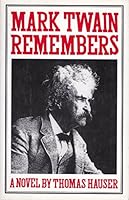Description
Veteran novelist (The Hawthorne Group) and biographer (Muhammad Ali and Company) Hauser has "commingled Mark Twain's words and ideas of my own" in this witty, elegiac novel. When it opens in 1910, Twain, believing his death is near, remembers a chain of events that changed his life. In the spring of 1856, 20-year-old Samuel Langhorne Clemens surveys his spotty work history, and decides to travel. Aiming for California, he makes his way to Saint Joseph, Mo., where he boards an overland stage. After two days, he stops at a small town, where he first encounters Hiram Kane, an enterprising freed slave who's promoting an act where, for a nickel, white men can punch Bones, a "nigger" who's guaranteed not to hit back. Kane's cruel character leaves a strong impression on Twain, who is "part fascinated and part revulsed." Low on money, Twain decides to stay awhile in his next stop, a friendly town in northwestern Kansas. Soon he is aware that "Bleeding Kansas" is abroil with the question of slavery. Meeting Kane again, Twain learns the hard way that Bones is a skilled defensive fighter. Twain wins ownership of Bones in a poker game and wants to free him, but, discovering Bones has no prospects, he sets up a deal in which Bones fights and the proceeds are split 50-50. But a passionate liaison with beautiful woman rancher, and the suspenseful discovery of her betrayal, leaves Twain fearing that he must cancel the bout. Against the odds, they go ahead with the racially charged and exciting fight. A bittersweet ending perfectly caps this swift moral adventure. Succinct history lessons contextualize the tale, and the writing is so smooth it's impossible to tell which words are Twain's and which Hauser's. (Sept.)
Copyright 1999 Reed Business Information, Inc.


 Amazon UK
Amazon UK